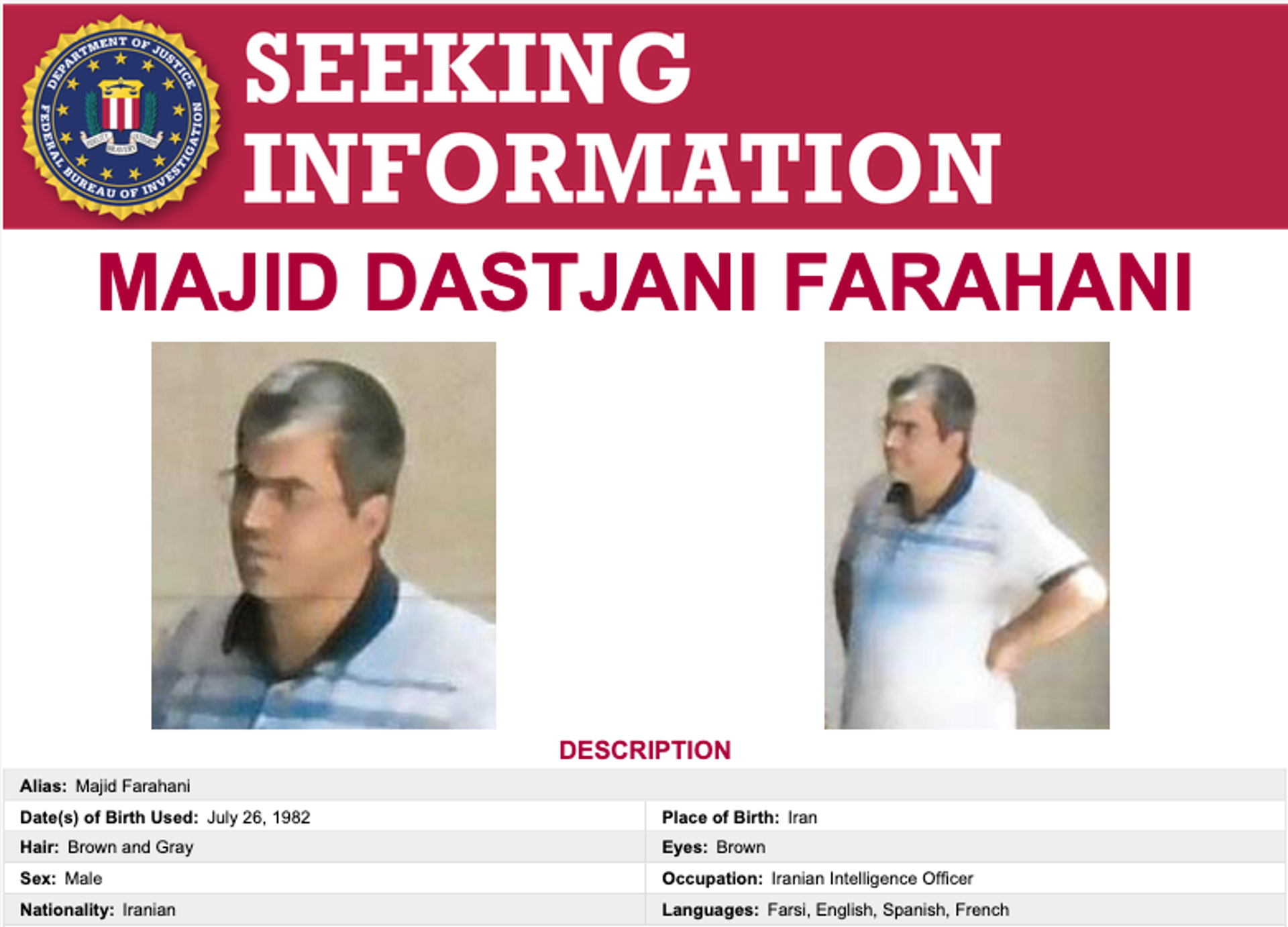The Scoop
The U.S. government is intensifying a manhunt for an Iranian intelligence operative who the Federal Bureau of Investigation believes has been plotting to assassinate current and former American officials, including one-time Secretary of State Mike Pompeo.
The FBI’s Miami field office on Friday issued a public alert seeking information on Majid Dastjani Farahani, a suspected member of Iran’s Ministry of Intelligence and Security, who the Bureau alleged has been recruiting “individuals for operations in the U.S., to include lethal targeting of current/former USG officials.”
It’s unclear why the FBI issued its warning in Florida. But the U.S. government warned in a Most Wanted notice issued Friday that Farahani speaks Spanish and frequently moves between Iran and Venezuela. The U.S.’s Department of Justice convicted an alleged Iranian operative in 2011 of working with Mexican drug cartels to attempt to assassinate Saudi Arabia’s former ambassador to Washington, Adel al-Jubeir, while he dined at a Georgetown restaurant. In January, the DoJ indicted an Iranian gang leader for allegedly working with members of the Hells Angels to kill Iranian dissidents living in Maryland.
The Iranian government has repeatedly vowed over the past four years to avenge the 2020 death of Major General Qasem Soleimani – a commander of Iran’s elite Qods Force – whom the Trump administration assassinated in Baghdad using a drone strike on his convoy. The DoJ indicted members of Iran’s Islamic Revolutionary Guard Corp (IRGC) in 2022 for allegedly plotting to murder Trump’s former national security adviser, John Bolton, who served in the White House in the months leading up to Soleimani’s death.
U.S. officials told Semafor they believe Pompeo and Trump’s special envoy for Iran, Brian Hook, are also on Tehran’s hit list. The U.S. government is currently providing both men with around-the-clock security due to the severity of the threat.
The FBI said Friday that Farahani, 42, was recruiting individuals “as revenge” for Soleimani’s death and to conduct “surveillance activities focused on religious sites, businesses, and other facilities in the United States.” The Treasury Department sanctioned Farahani in December.
In this article:
Jay’s view
The Biden administration’s backing of Israel in its war against the Palestinian militant group Hamas – which is armed and funded by Iran – has significantly raised tensions between Washington and Tehran. An Iranian-backed militia killed three U.S. soldiers during a January drone strike on an American military base in Jordan. But any Iranian operation that kills a current or former U.S. official, or a political dissident, on American soil could cross a red line that leads Washington to retaliate against Tehran directly.
There’s growing evidence that Iran and its allies are operating aggressively inside the U.S. In August 2022, a self-avowed supporter of the Islamic Republic stabbed the British-American novelist Salman Rushdie at an upstate New York literary festival in a suspected attempt to make good on the religious fatwa Tehran placed on the writer’s head in 1989. The Department of Justice is still investigating whether the Lebanese-American assailant was acting directly under Iran’s orders.
Last January, the DoJ indicted three natives of Azerbaijan for allegedly attempting to murder the Iranian-American women’s rights activist, Masih Alinejad, in New York. U.S. law enforcement said they also derailed a 2021 Iranian plot that aimed to kidnap Alinejad in Brooklyn and spirit her by speedboat to Venezuela, a close ally of Iran’s.
Tehran, in virtually all of its operations against the U.S. – including military strikes and assassination plots – appear to work almost solely through proxies. United States law enforcement officials told Semafor that they assume Tehran would maintain this doctrine in any attack on the Trump-era officials, and Farahani appears to be working along these same lines. This could make proving attribution behind any attack very difficult, these officials said.
Brian Hook, the former U.S. envoy, told a congressional hearing last week that he believed the plots against him continued and thanked U.S. law enforcement for protecting him. “I wish we were in a place that it was not necessary, but that is where we are,” he said.
The View From Iran
The Iranian government has made the avenging of Soleimani’s assassination one of its top national security objectives. Senior members of the IRGC have said in recent weeks that Hamas’s October attack on southern Israel was driven, in part, by this aim. “The Al-Aqsa Storm was one of the retaliations of the Axis of Resistance against the Zionists for the martyrdom of Qasem Soleimani,” Iranian state media quoted IRGC spokesman, Ramezan Sharif, as saying in December.
Iranian President Ebrahim Raisi also openly threatened U.S. officials for assassination during his September speech at the United Nations in New York. “The Islamic Republic of Iran, through all tools and capacities in order to bring to justice the perpetrators and all those who had a hand in this government sanctioned act of terror, will not sit until that is done,” he said. “The blood of the oppressed will not be forgotten.”
Notable
- The U.S. and U.K. jointly sanctioned 11 Iranian individuals in January who were allegedly involved in attempts to assassinate dissidents and political opponents overseas.
